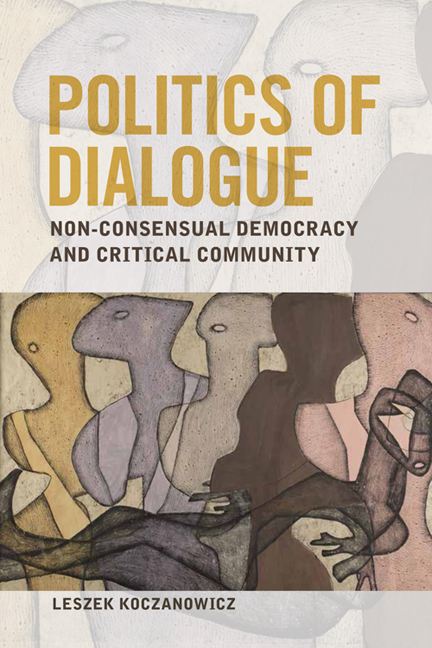4 - Coda: Non-Consensual Democracy as a Political Form of Critical Community
Published online by Cambridge University Press: 05 August 2016
Summary
Democratic Community between Consensus and Disagreement
As I demonstrated in the previous chapters, pragmatists have insisted that there is a continuity between everyday life, community and democracy. Everyday interactions make up the texture of social life, which achieves its fullest expression in the form of community with shared values, goals and rituals. Communities, in turn, become petrified in particular political forms, which buttress them by, for example, immunising them against internal fracas. In this model, democracy is a system that most effectively facilitates social interactions, since only democracy ensures uninterrupted communication, endorsed by Habermas as an ultimate point of reference, a utopia of a fully realised democratic system.
The model is, however, tenable provided that there is a high degree of idealisation. The greater number of factors of social development we take into account, the more acutely aware we become of what can be called democracy's Janus-like face. Existence of a democratic society is predicated upon internal concord, be it voluntary or enforced. At the same time, conflict is an equally important condition of democracy, since it is a driving force behind its development and prevents society from slipping into a tyranny of one group or one person. This problem did not escape the notice of Ancient Greek thinkers, who were the first to theorise democracy.
Since the beginning of reflection on democracy and politics, it has been clear that social and political life entails conflict as well as harmony. The Ancient Greeks’ preoccupation with the issue of conflict and harmony in the polis led them to acknowledge that conflict was both inevitable and, at the same time, illegitimate, while the central challenge was to devise ways for community to avoid it. Given this, they distinguished two concepts of conflict: conflict understood as stasis is distinct from conflict understood as polemos; the former is conflict between friends, whereas the latter is between enemies. The former is much more dramatic and can have farreaching consequences. Bernard Yack, whose account of Aristotelian thought I follow here, notes that
it is primarily political friends who become class enemies in Aristotle's account. In other words, it is primarily those who have the mutual expectations characteristic of members of political communities who turn the division between rich and poor into the main source of their social conflict.
- Type
- Chapter
- Information
- Politics of DialogueNon-consensual Democracy and Critical Community, pp. 146 - 170Publisher: Edinburgh University PressPrint publication year: 2014



